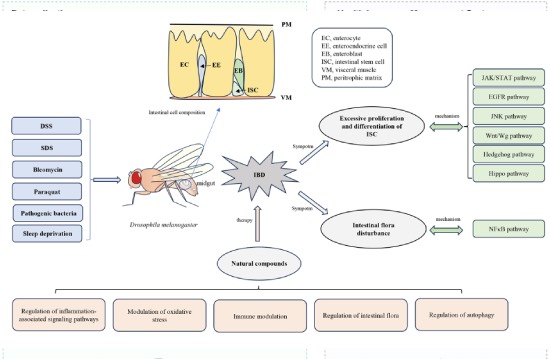Drosophila melanogaster models for investigating inflammatory bowel disease: Methods, pathology, mechanisms, and therapeutic approaches
DOI:
https://doi.org/10.17305/bb.2025.12656Keywords:
Inflammatory bowel disease , IBD, Drosophila melanogaster, gut microbiota, intestinal stem cells, ISC, inflammatory pathways, natural productsAbstract
Inflammatory bowel disease (IBD) is a complex disorder characterized by chronic gastrointestinal inflammation. This paper examines the use of Drosophila melanogaster as a model organism to investigate interactions among the gut microbiota, intestinal stem cells (ISCs), and signaling pathways involved in IBD pathogenesis. Key findings indicate that dysbiosis of the gut microbiota significantly contributes to IBD by altering immune responses and inflammatory signaling, leading to increased intestinal damage. Additionally, ISCs are crucial for intestinal regeneration; their dysregulation exacerbates injury, highlighting their role in maintaining gut homeostasis. Natural compounds, particularly those derived from traditional herbal medicines, show promise in alleviating IBD symptoms by targeting oxidative stress, regulating inflammation, and modulating autophagy, thus promoting ISC homeostasis and restoring microbial balance. This review underscores the intricate relationships among the gut microbiota, ISCs, and inflammatory pathways in IBD, as elucidated through Drosophila studies. The studies summarized here emphasize the need to address microbial imbalances, ISC dysregulation, and inflammatory mechanisms to develop effective therapeutic strategies. Further research is essential to fully elucidate these interactions and inform innovative treatments that improve patient outcomes in IBD management.
Citations
Downloads

Downloads
Published
Issue
Section
Categories
License
Copyright (c) 2025 Xinyi Li, Shushen Sun, Xiaoxi Liu, Qinghao Meng, Mengzhe Tian, Jingyi Li, Suxia Ren, Zengyi Huang, Yiwen Wang, Shaoshan Du

This work is licensed under a Creative Commons Attribution 4.0 International License.









